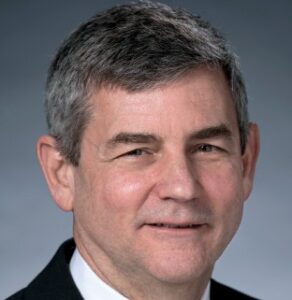Shipbuilding’s Lessons on Leadership, from Huntington Ingalls CEO Mike Petters
With more than 42,000 employees around the United States, Huntington Ingalls Industries might be the biggest company you have never heard of. As the United States’ largest military shipbuilder, the company has a low profile outside of government circles but massive influence in the economies and local communities of Virginia and Mississippi where it operates.
 The organization’s commitment to its communities should come as no surprise to those familiar with CEO Mike Petters. Since becoming chief executive of the shipbuilder in 2011, he has used his pulpit to advocate for investing in people and communities. As a signatory to the Business Roundtable’s 2019 statement redefining the purpose of the corporation, Mr. Petters is one of 187 leading CEOs committed to treating all stakeholders—employees and customers alike—ethically and responsibly.
The organization’s commitment to its communities should come as no surprise to those familiar with CEO Mike Petters. Since becoming chief executive of the shipbuilder in 2011, he has used his pulpit to advocate for investing in people and communities. As a signatory to the Business Roundtable’s 2019 statement redefining the purpose of the corporation, Mr. Petters is one of 187 leading CEOs committed to treating all stakeholders—employees and customers alike—ethically and responsibly.
What this looks like at Huntington Ingalls is a tuition reimbursement program that can extend even to assisting employees with preschool expenses for their children. Mr. Petters has also resisted pressure to use quarterly profits as a benchmark for success, focusing instead on tracking progress against the company’s five-year plans. Patient investors have been rewarded with a more-than-sevenfold increase in the price of the company’s shares, as of February, since Mr. Petters took the helm.
IQ: As a member of the Business Roundtable, how are you leading Huntington Ingalls forward as an example of long-term, responsible growth?
Mike Petters: As the largest manufacturing employer in Mississippi and the largest industrial employer in Virginia, we have a strong presence in our communities and concerns for the same issues that they do. We think of ourselves as a workforce-development company, so we have to be engaged in the entire pipeline of creating workforces, including schools, community colleges and higher education.
We offer scholarships for children of our employees to attend post-secondary schools and even provide funding, through our HII Scholarship Program, for employees to send their kids to preschool programs—particularly those employees who may not otherwise be able to afford it.
Receiving a scholarship doesn’t lock people in to becoming employees, but it does give their parents an understanding of how committed the company is to their well-being and their family’s well-being. They come to work more engaged and more productive.
There’s a line in the song “What a Wonderful World:” “They’ll learn so much more than I’ll ever know.” It’s our responsibility to make sure that future generations are more capable than we are.
Parts of our company have been around 130 years and will be here after I’m gone. I want to make things better than when I got here. Share on X That means developing stronger skill sets for the next generation, too.
“Parts of our company have been around 130 years andwill be here after I’m gone. I want to make things better than when I got here. That means developing stronger skill sets for the next generation, too.”
—Mike Petters, CEO, Huntington Ingalls Industries
IQ: What are you doing to help change Wall Street’s focus on quarterly profits to more of a long-term view?
MP: It’s an oversimplification to say Wall Street is focused exclusively on the short term because there are actually many people and institutions there that have a long-range horizon. Our business has a pretty long cycle to it. Some of our ships take eight years to build and years of planning ahead of that. We’ve been explicit to investors that if you’re looking out the next 90 days, then we’re not a company you should be interested in. In fact, we don’t provide direct earnings guidance to the Street. When we spun out of Northrop Grumman in 2011, we told investors what we were looking to do for the next five years. We’re soon going to do that again.
IQ: Do you think it is appropriate for CEOs to voice their political opinions on matters that do not directly affect their businesses?
MP: CEOs have to make judgments all the time on whether an issue merits engagement on behalf of one or more stakeholders, and our stakeholder community is very diverse. I’m not sure I’ve seen CEOs comment on something that isn’t in the interest of some part of their community. They’ve done the calculus and they know where there’s a connection between their roles and their constituents’ interests. Our system wants issues to be sorted out. Keeping good ideas to yourself doesn’t help anybody. Being open is integral to the health of the organization.
IQ: How do you ensure that the organization models its stated values?
MP: We believe the most important source of information for our people is their supervisor. We make sure that if you’re selected into a leadership position that you wear and live the values. For example, the first topic on the agenda at my monthly staff meeting is safety, followed by ethics [and] diversity and inclusion. If I’m going to allocate time in my meeting to those issues, then it shouldn’t be a problem for other leaders in the company to do that as well.
We have lots of metrics in areas like safety and diversity, although we don’t create quotas. Most important is that we regularly conduct employee surveys to be sure people are engaged and productive.
IQ: What attributes do you believe separate a good CEO from a great one in today’s business environment?
MP: The great CEOs understand the power of their personality. I learned that early in my career. When I was a very young in the organization, I did things the way I thought they should be done. My quarterly meetings with the 100 or so leaders in my group were death by PowerPoint. We had metrics for everything, but I got the sense we were going through the motions. People didn’t have a lot of enthusiasm about coming to the meeting, and I couldn’t say the next day [if] things were better or worse.
One day a 40-year shipbuilder came up to me after one of those meetings and said: “Mike, you’ve got a lot of passion and strong beliefs. As long as you keep showing people stoplight charts, they won’t see who you are. Show them something that gives them purpose to come to work.”
That wasn’t my comfort zone then and it isn’t now, but the next meeting we killed all the slides. We replaced them with slides that said what I think is important and care about. It so happened that the meeting took place as tensions were growing between China and Taiwan and the USS Nimitz was racing from the Gulf of Arabia to respond. It turned out a lot of members of my leadership team had worked on the Nimitz. We were able to turn that into a discussion about how the work they did was contributing to freedom.
The advice I give young leaders is to show people who you are so they can decide whether to follow you. The heart is what matters.
“The advice I give young leaders is to show people who you are so they can decide whether to follow you. The heart is what matters.” —Mike Petters, CEO, Huntington Ingalls Industries
IQ: How do you promote innovation at Huntington Ingalls without overextending resources or chasing bad ideas?
MP: I’m a big believer in crowdsourcing. Once people understand an issue, they don’t need me to come up with the bright idea. The organization will do that. You just need to convince them that it’s an important issue. The hard part isn’t the technology but getting leaders to understand that their current way of doing business may not only not be innovative but also put the organization at risk. Once they understand that, we can help them. But we must get leaders to care first.
A couple of years ago we divided the top 350 people in the organization into 35 teams and gave them four months to think of ways to steal value from the company. We learned a lot about where we had exposure, but we also got the benefit of 350 people worrying about threats, not just me. We’re a lot more innovative company now as a result.
IQ: What are the biggest challenges facing Huntington Ingalls in the next five to 10 years?
MP: We have a significant backlog in our shipbuilding business, but the Navy is going to be looking at the best ways to deal with geopolitical issues in the future, and it may not be the way they’ve done it in the past. We need to be in step with them. We need to combine that with an evaluation of the current manufacturing processes we have and how work is going to change over the next 10 years. Are there things we’ll need to be good at in the future that we’re not good at today?
IQ: What has shaped and informed your leadership style? What experiences, advice or inspiration do you draw upon?
MP: I’ve had the opportunity to work with scores of people, and every time I take away something I liked or didn’t like to blend into my own style. At some level, all of us are a summation of our experiences.
I also keep things in perspective. When I got to my first ship in the Navy, I worked 20-hour days because I didn’t want to fail the 20% of sailors who were my responsibility. When it came time to do a fitness report, the commanding officer wrote a glowing evaluation of my work. But as I was getting up to leave, he told me to sit down again. He said that for every person who makes admiral, there are 15 equally qualified people who don’t get there. In most cases, it has little to do with how hard they work. If your ambition is to be an admiral and you don’t make it, he said, you run the risk of becoming bitter.
On the other hand, if you make it your ambition to work with some of the best people on the planet and have orders-of-magnitude more responsibility than anyone else your age, then you’re going to love what you do regardless of whether you become an admiral.
There was so much wisdom in that message. I never set out to be CEO of this company, but I have tried to make sure that I was the best I could be at every job and was always making other people better. Whatever you do, do your best work.



